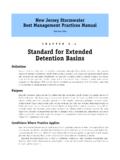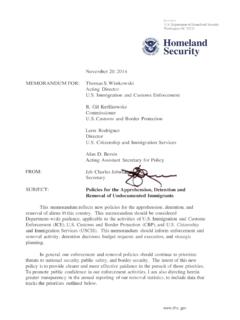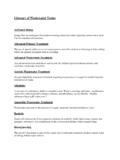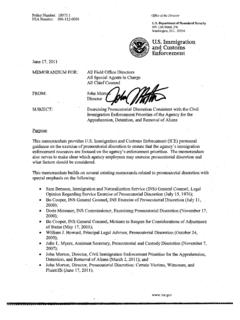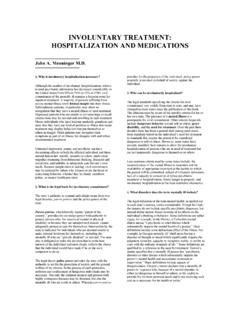Transcription of THE USE OF DETENTION AND ALTERNATIVES TO …
1 INTERNATIONAL ORGANIZATION FOR MIGRATION. EUROPEAN MIGRATION NETWORK. THE USE OF DETENTION AND ALTERNATIVES . TO DETENTION IN lithuania . 2014. EMN Focussed Study 2014. The Use of DETENTION and ALTERNATIVES to DETENTION in lithuania CONTENT. Summary .. 3. Section 1: Categories of third-country nationals that can be detained, national provisions and grounds for DETENTION .. 5. Section 2: Assessment procedures and criteria for the placement of third-country nationals in DETENTION .. 10. Section 3: Types of DETENTION facilities and conditions of DETENTION .. 15. Section 4: Availability and practical organisation of ALTERNATIVES to DETENTION .. 18. Section 5: Assessment procedures and criteria used for the placement of third-country nationals in ALTERNATIVES to DETENTION .. 21. Section 6: Impact of DETENTION and ALTERNATIVES to DETENTION on the effectiveness of return and international protection procedures .. 23. Conclusions .. 29. Annexes .. 30. 2. EMN Focussed Study 2014. The Use of DETENTION and ALTERNATIVES to DETENTION in lithuania Summary Context.
2 In lithuania , on average 3,000 aliens per year violate the procedure for entry, presence, transit and departure of aliens from the Republic of lithuania . Approximately 260 aliens are detained annually for more than 48 hours for illegal entry and stay in the Republic of lithuania . Under court decisions, ALTERNATIVES to DETENTION are provided on average to 38 aliens per year. Grounds for DETENTION of aliens. Based on the interpretation issued by the Constitutional Court of the Republic of lithuania in its ruling of 5 February 1999, a person s DETENTION is an ultima ratio and can be applied only in the cases where the objectives specified by the law cannot be achieved by other means. Chapter VII of the Law of the Republic of lithuania on the Legal Status of Aliens (the Law ) regulates DETENTION of aliens. The Law provides for an exhaustive list of grounds for DETENTION of vulnerable persons. Vulnerable persons and families with minor aliens may be detained only in an exceptional case, taking into account the best interests of a child and vulnerable persons.
3 In practice, such cases occur highly rarely. DETENTION of asylum seekers. The asylum seekers who had illegally entered the country and had lodged an application for asylum were not subject to DETENTION before 1 February 2012, because there was no legal basis. Such asylum seekers used to be provided with accommodation at the Foreigners Registration Centre without restricting their freedom of movement. Approximately 70 per cent of the asylum seekers used to depart subsequently in violation of the internal rules of the Centre and not come back thus abusing the asylum procedure. On 1 February 2012, Article 113 was supplemented with paragraph 2, according to which the Supreme Administrative Court of lithuania adopted a practice that an asylum seeker may be detained if he hinders the adoption or implementation of the appropriate decision or may abscond in order to avoid return, expulsion or transfer, On 24 October 2013, Article 113 of the Law was supplemented with paragraph 4, which stipulates in detail grounds for DETENTION of asylum Assessment of the appropriateness of DETENTION .
4 An alien may be detained solely on the grounds provided for in Article 113 of the Law. The alien may be detained for a period not exceeding 48 hours by a police officer or an officer of another law enforcement institution. For a period exceeding 48 hours, the alien may be detained only by a court s decision. When adopting such a decision, the court examines each case individually and takes the decision with regard to a specific situation and all the relevant circumstances. DETENTION facilities and length of time in DETENTION . In lithuania , there is one body for the DETENTION of aliens in breach of provisions of the Law, that is, the Foreigners Registration Centre. The Centre has two separate buildings: a closed building, which accommodates the aliens who are detained under a court s 1. Article 113(1): An alien may be detained on the following grounds: 1) in order to prevent the alien from entering the Republic of lithuania without a permit; 2) if the alien has unlawfully entered or stays in the Republic of lithuania ; 3) when it is attempted to return the alien who has been refused entry into the Republic of lithuania to the country from which he arrived; 4) when the alien is suspected of using forged documents; 5) when a decision is made to expel the alien from the Republic of lithuania or another state; 6) in order to prevent the spread of dangerous and particularly dangerous contagious diseases; 7) when the alien s stay in the Republic of lithuania constitutes a threat to national security, public order or public health.
5 2. Article 113(2): Where the issues of an alien s return to the foreign country, his expulsion from the Republic of lithuania , an obligation to depart from the Republic of lithuania or transfer of an asylum seeker to another EU Member State responsible for examination of an asylum application are dealt with, the alien may be detained only in the case where the DETENTION is necessary for the adoption or implementation of the appropriate decision (where the alien hinders the adoption or implementation of the decision or may abscond to avoid return, expulsion, or transfer, etc.). 3. Article 113(4): An asylum seeker may be detained on grounds on illegal entry to the Republic of lithuania or illegal stay therein only for the purposes of establishing and/or verifying his identity/nationality and/or identifying the reasons for lodging the application for asylum, also where his application for asylum is based on the grounds clearly unrelated to the threat of persecution in the country of origin or is based on fraud or where the asylum seeker has not been granted temporary territorial asylum and there are grounds to believe that he may abscond in order to avoid return to a foreign country or expulsion from the Republic of lithuania .
6 3. EMN Focussed Study 2014. The Use of DETENTION and ALTERNATIVES to DETENTION in lithuania decision, and an open building the aliens whose freedom of movement is not restricted. An alien may not be detained for more than 6 months, except for the cases when he refuses to cooperate with a view to his expulsion from the Republic of lithuania (refuses to provide data about himself, provides misleading information, etc.) or where the documents necessary to execute the expulsion of such an alien are not received. In such cases, the DETENTION period may be extended for a further period of up to 12 months. In 2013, the length of time in DETENTION in respect of aliens at the Foreigners Registration Centre was on average 38 days. ALTERNATIVES to DETENTION and provision of such ALTERNATIVES . A decision on the provision of ALTERNATIVES to DETENTION is adopted by a court. Case law shows that ALTERNATIVES to detention4 are provided only when the conditions provided for by the Law are met: 1) an alien's identity has been established, 2) he constitutes no threat to national security and public order, 3) he provides assistance to the court in determining his legal status in the Republic of lithuania , as well as other circumstances.
7 Unaccompanied minors are not detained in lithuania and are subject to an alternative to DETENTION , namely, entrusting the guardianship of an alien to a relevant social agency. Asylum seekers who have illegally entered lithuania may, under a court s decision, be provided another alternative to DETENTION , namely, accommodation at the Foreigners Registration Centre without restricting the freedom of movement. In respect of other aliens, ALTERNATIVES to DETENTION are usually prescribed by the court if the aliens meet the above conditions and hold adequate means of subsistence or have social or family connections with lithuania , etc. Appeal against decisions. An alien may appeal against a decision on DETENTION or provision of ALTERNATIVES to DETENTION in accordance with the procedure laid down by the Law on Administrative Proceedings within 14. days from the adoption of the decision. The court must examine the alien s appeal not later than within 10. days from the acceptance of the appeal.
8 4. ALTERNATIVES to DETENTION are listed in Article 115 of the Law: 1) the alien is required to regularly at the fixed time appear at the appropriate territorial police agency; 2) the alien is required, by means of communication, to inform the appropriate territorial police agency at the fixed time about his whereabouts; 3) entrusting the guardianship of an unaccompanied minor alien to a relevant social agency (applicable exclusively to unaccompanied minors); 4) entrusting the guardianship of an alien, pending the resolution of the issue of his DETENTION , to a citizen of the Republic of lithuania or an alien lawfully residing in the Republic of lithuania who is related to the alien, provided that the person undertakes to take care of and support the alien; 5) accommodating the alien at the Foreigners Registration Centre without restricting his freedom of movement (applicable exclusively to asylum seekers). 4. EMN Focussed Study 2014. The Use of DETENTION and ALTERNATIVES to DETENTION in lithuania Section 1: Categories of third-country nationals that can be detained, national provisions and grounds for DETENTION Q1.
9 Please complete the table below with regard to the categories of third-country nationals that can be detained in your Member State. Children and other vulnerable groups are not included in this table as they are a cross-cutting category; instead, they are dealt with in a separate question (Q2). after the table. Grounds for DETENTION of aliens are provided for in Article 113 of the Law. The list of the grounds for DETENTION is exhaustive. Article 113. Grounds for DETENTION of an Alien 1. An alien who is not a citizen of an EU Member State, his family member or another person exercising the right of free movement of persons under legal acts of the European Union may be detained on the following grounds: 1) in order to prevent the alien from entering the Republic of lithuania without a permit;. 2) 2) if the alien has unlawfully entered or stays in the Republic of lithuania ;. 3) 3) when it is attempted to return the alien who has been refused entry into the Republic of lithuania to the country from which he arrived.
10 4) 4when the alien is suspected of using forged documents;. 5) when a decision is made to expel the alien from the Republic of lithuania or another state to which Council Directive 2001/40/EC of 28 May 2001 on the mutual recognition of decisions on the expulsion of third country nationals applies;. 6) in order to prevent the spread of dangerous and particularly dangerous contagious diseases;. 7) when the alien s stay in the Republic of lithuania constitutes a threat to national security, public order or public health. 2. Where the issues of an alien s return to the foreign country, his expulsion from the Republic of lithuania , an obligation to depart from the Republic of lithuania or transfer of an asylum seeker to another EU Member State responsible for examination of an asylum application are dealt with, the alien may be detained only in the case where the DETENTION is necessary for the adoption or implementation of the appropriate decision (where the alien hinders the adoption or implementation of the decision, may abscond to avoid return, expulsion or transfer, etc.




